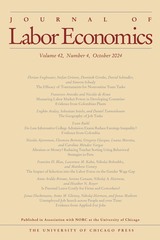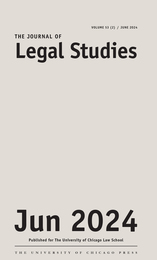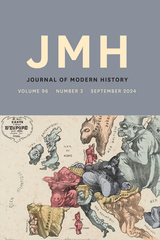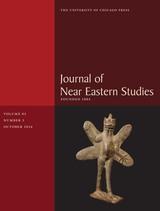
"This book offers something that has been very much needed in Garvey scholarship—an accessible reader of Amy Jacques Garvey’s editorials aimed both for the general reader and the college classroom. Parascandola does a service by selecting from a broad range of topics and presenting Jacques Garvey’s editorials in an easily read and intellectually challenging format.”
—Barbara Bair, historian at the Library of Congress and associate editor with Robert Hill and others of The Marcus Garvey and Universal Negro Improvement Association Papers
Amy Jacques Garvey was one of the most prolific women within any Black nationalist group, yet she has largely only been discussed in relationship to her husband, Black nationalist Marcus Garvey, and as the editor of the Philosophy and Opinions of Marcus Garvey. Much of her writing has remained unavailable to the public, lost to the archives, until now. Amy Jacques Garvey: Selected Writings from the Negro World, 1923–1928 seeks to fill this void by making her writings in the Negro Worldwidely available for the first time.
Editor Louis J. Parascandola compiles a wide swath of Jacques Garvey’s work in this groundbreaking collection. Born and educated in Jamaica, Jacques Garvey’s atypical opportunity to receive education at elite Jamaican schools, along with her later jobs as a clerk and secretary, prepared her for future positions as journalist and political administrator. She also possessed the rhetorical skills and independent thinking that would help her challenge Marcus Garvey and the other men in Garvey’s organization, the Universal Negro Improvement Association and African Communities League (UNIA). In allowing Jacques Garvey’s work to largely speak for itself, the volume reveals that she concerned herself with a diversity of important and often controversial political and social issues rather than the stereotypical domestic matters expected of most woman’s pages of the time period.
By examining her selected writings in the Negro World, this volume affords its readers a better understanding of Jacques Garvey’s powerful contribution not only to Garveyism but also to the growth of Black radical thought, anti-imperialist ideology, and the rights of third-world women. This timely study sheds new light on Jacques Garvey’s pivotal role as a Black female writer and thinker during the twenties.
LOUIS J. PARASCANDOLA is a professor of English at Long Island University. He is the author of “Puzzled Which to Choose”: Conflicting Sociopolitical Views in the Works of Captain Frederick Marryat, editor of a book on Coney Island, and editor or coeditor of four critical editions of Caribbean immigrant writing.
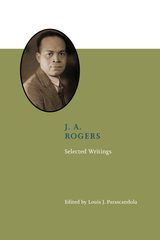
“No man living has revealed so many important facts about the Negro race as has Rogers,” wrote W. E. B. DuBois. Indeed, as Henry Louis Gates Jr. contends, J. A. Rogers was often the only source for an ordinary Black person to learn of their history from the 1920s through the 1970s. Now Louis J. Parascandola makes available an accessible collection of Rogers’s writings for a new generation.
Joel Augustus Rogers was born in Negril, Jamaica, in the late nineteenth century, where—although his father was a teacher—he received only basic education. Rogers emigrated to the United States and studied at the Art Institute of Chicago while working as a Pullman porter. He later took up journalism and moved to New York for better opportunities, writing for papers and journals published by the likes of Marcus Garvey, W. E. B. DuBois, and H. L. Mencken. While working with the Pittsburgh Courier, he was assigned to cover the Italo-Ethiopian War (1935–1937), becoming the first American Black foreign war correspondent. His column for the Courier became vital to the Black middle class, conveying stories of Black achievements and relating a distinguished history that imparted knowledge and pride. He continued this work with his books 100 Amazing Facts about the Negro with Complete Proof, the two-volume The World’s Great People of Color 3000 B.C. to 1946 A.D., and the novel From Superman to Man.
This engaging collection represents the wide range of Rogers’s work across time and demonstrates his intellectual philosophy. J. A. Rogers: Selected Writings is required reading for anyone interested in Black nationalism, Black journalism, Black literature, and Pan-African culture and identity.

Eugene Gordon (1891–1974) was a major writer involved in the development of the burgeoning Black literary scene in Boston in the 1920s, an active player in the Harlem Renaissance, and a longtime member of the Communist Party. Despite his credentials as a reporter, editor, fiction writer, and political activist, he is rarely mentioned in studies of the Harlem Renaissance or Marxist politics. Here, Louis Parascandola has pulled together Gordon’s journalism, autobiographical writing, and fiction. This new collection, featuring both previously published pieces from a wide variety of publications as well as material that has never before been published, demonstrates his range and his skill while establishing his importance as a critical voice of his time.
Gordon was born and raised in the South but made his way north at a young age. In Boston, he founded the Saturday Evening Quill Club, an African American literary group that included other notable writers such as Helene Johnson and Dorothy West. He later became editor of and contributor to two major publications coming out of the era: the Messenger and Opportunity: A Journal of Negro Life. As he grew more political, he joined the Communist Party in the 1930s and became editor of and contributor to the New Masses. Scholars looking to research him have struggled to find disparate writings to get a fuller sense of his literary stylings as well as his political commitments. This welcome new volume establishes Gordon as a significant, understudied figure.
READERS
Browse our collection.
PUBLISHERS
See BiblioVault's publisher services.
STUDENT SERVICES
Files for college accessibility offices.
UChicago Accessibility Resources
home | accessibility | search | about | contact us
BiblioVault ® 2001 - 2024
The University of Chicago Press


